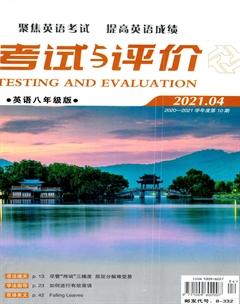Questions & Answers
张昕
【问】请问下面这道题应该选哪个答案?
Wed better ____ late for school.
A. to not be B. not be
C. not to be D. to be not
(上海 王海滨)
【答】此题应该选B。
had better意为“最好”,其后接动词原形,其否定式为had better not + 动词原形。如:
Youd better stay here for another few days. 你最好在这儿再住几天。
Wed better not invite him. 我们最好不要邀请他。
【问】下面这道题可以填in the front of吗?
楼房前面有一棵大树。(根据汉语意思完成句子)
There is a big tree ___ the building.
(河南郑州 王 杰)
【答】不能填in the front of, 应该填in
front of。
in front of意为“在……前面”,是指在某物体外部的前面。如:
Our school is in front of the library. 我们的学校在图书馆前面。
in the front of也可以表示“在……前面”,但它指的是在某一物体的内部的前面。如:
She is sitting in the front of the bus. 她坐在公共汽车的前面。
题意为“楼房前面有一棵大树”,是在“外部的前面”,故填in front of。
【问】 下面这道题应该选A吗?
____ of us has a good plan for the holiday.
A. Every B. Each C. Both D. All
(贵州贵阳 刘冬梅)
【答】答案为B。
each意为“每个,各个,各自”, 强调各别、各个,其后也可以接介词of构成短语,作主语时,谓语动词要用单数。如:
Each has his merits. 各有所长。
Each of his children goes to a different school. 他的每个孩子都在不同的学校里读书。
而every 强调全部,不能与介词of连用。如:
Every child knows it. 每个小孩都知道这件事。
由于every不能与介词of连用;both指两者;all指三者或三者以上,作主语时,谓语应用复数,所以该题应该选B。
【问】请问下面这道补全对话题怎么做?
选择适当的句子完成对话,有两项是多余的。
He Xiu: Hi, Xiao Fang!__1__
Xiao Fang: I went to Chengdu.
He Xiu: Really? __2__
Xiao Fang: It was wonderful. I had a good time there.
He Xiu: __3__
Xiao Fang: I went with my parents.
He Xiu: __4__
Xiao Fang: By train.
He Xiu: __5__
Xiao Fang: Only four days.
He Xiu: What place did you visit?
Xiao Fang: We visited Mount Emei.
A. Where do you want to go?
B. Where did you go during May Day?
C. How often do you go there?
D. Who did you go with?
E. How long were you there?
F. How was your trip?
G. How did you travel?
(四川綿阳 蒋玉婷)
【答】该题答案为:BFDGE。
第1空的后一句答语意为“我去了成都”,根据该句可知前一句应该询问“去过哪里”,所以第1空选B。
根据第2空的后一句答语可知,第2空问的是“旅游得怎么样”,所以第2空选F。
第3空的后一句答语意为“我和我的父母一起去的”,很明显前一句应该询问“和谁一起去的”,所以第3空选D。
第4空的后一句答语是By train,很明显前一句应该询问“去的方式”,所以第4空选G。
第5空的后一句答语意为“只有四天”,所以前一句应该用“How long”来询问,所以第5空选E。
【问】下面这道题我不会做,请您给我解答一下,好吗?
I can write ___ English, but I can read ___ English words.
A. a few; few B. little; a few
C. few; little D. little; a little
(天津_田_芳)
【答】要解这道题,必须弄清楚a little, little, a few和few这四个词的区别。a little和little用于修饰不可数名词,a few和few用于修饰可数名词。a little和a few表示肯定意义,意为“一点或几个”,而little和few表示否定意义,意为“几乎没有”。
你所问的这道题中前一个English意为“英语”,是不可数名词,不能用a few或few来修饰,故A、C两项是错误的;第二个English意为“英语的”,是形容词,它修饰可数名词words,故其前应用a few来修饰,而不能用a little修饰,故D项是错误的,所以正确答案应该选B。
【问】 请问下面这道题应该选哪个?
I usually ___ home at half past five in the afternoon.
A. get B. get to
C. arrive at D. arrive in
(遼宁东港_张_静)
【答】首先,我们要弄清楚get和arrive的区别。
get和arrive两者都可以表示“到达”的意思,get是不及物动词,其后须接介词to,在口语中用的稍多。若接地点副词如here, there, home等时,则不用介词to。如:
They can get there tomorrow. 明天他们能到那儿。
arrive 也是不及物动词,后面接宾语时,常接in或at。应注意,到达较大的地点时,要用介词in;到达小地方时,要用介词at。如:
We can arrive at the station at two oclock. 我们两点钟能到达车站。
arrive后接地点副词here, there, home等时,也不需要接介词。如:
What time did you arrive home? 你是几点钟到家的?
你所问的这道题,根据题干可知要表示“到家”,既可以说get home也可以说arrive home。故选A。

